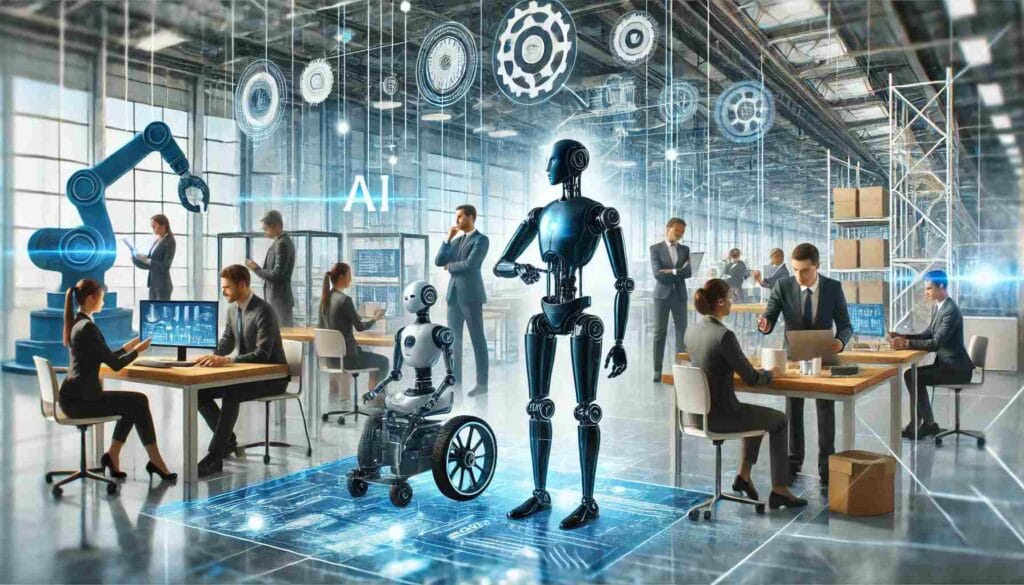The Impact of AI on Job Automation: Opportunities and Challenges

Artificial Intelligence (AI) is revolutionizing industries across the world, and one of the most profound impacts of this technology is on the job market. AI’s ability to analyze data, perform repetitive tasks, and even mimic human-like decision-making processes is transforming how businesses operate and how employees perform their jobs. Automation driven by AI is not only reshaping traditional roles but also creating new opportunities and challenges for the workforce.
The Role of AI in Job Automation
AI can automate a wide range of tasks that were traditionally performed by humans. This includes tasks that require significant manual labor, as well as those that involve decision-making based on large sets of data. For example, in industries such as manufacturing, AI-powered robots are increasingly handling assembly line tasks. These robots can work faster, more accurately, and without the need for breaks, making them an attractive option for businesses looking to improve efficiency.
In the service sector, AI chatbots and virtual assistants are being used to handle customer inquiries, process transactions, and provide support. This has led to a reduction in the number of customer service representatives needed, as AI systems can handle thousands of requests simultaneously without fatigue. Similarly, AI systems are being implemented in areas like data entry, scheduling, and even basic legal tasks, reducing the need for human intervention.
Jobs at Risk
While AI is streamlining operations in various sectors, it has also raised concerns about job displacement. Routine and repetitive tasks, such as those in manufacturing, data entry, telemarketing, and even certain roles in retail, are highly vulnerable to automation. Workers in these roles may face challenges in adapting to a rapidly changing job market, leading to a need for reskilling and upskilling.
However, AI is not only about replacing jobs; it’s also about transforming them. Many workers will need to adapt their skills to work alongside AI systems. Jobs that require creativity, emotional intelligence, and complex problem-solving are less likely to be fully automated. Professions like healthcare, education, and creative industries will see AI used as a tool to augment human performance rather than replace it.
The Benefits of AI in the Workforce
Despite concerns about job loss, AI-driven automation offers several benefits to businesses and employees. One of the key advantages is increased productivity. By automating repetitive tasks, AI frees up human workers to focus on more complex and strategic activities. This leads to more innovative ideas, better decision-making, and a more dynamic workplace.
Additionally, AI can improve workplace safety. Robots and AI systems can take on dangerous tasks in environments like mining, construction, or hazardous material handling. This reduces the risk of injury to human workers and improves overall safety standards.
Moreover, AI can enhance the accuracy and efficiency of decision-making processes. AI systems can analyze vast amounts of data quickly and identify patterns or insights that would be difficult for humans to detect. This capability is transforming fields like finance, healthcare, and logistics, where precision and speed are critical.
The Future of Work and AI
The future of work in the age of AI will likely be characterized by collaboration between humans and machines. Rather than fully replacing human workers, AI will serve as a tool to amplify their capabilities. The key to navigating this shift will be education and training. Workers will need to acquire new skills to remain competitive in a rapidly evolving job market. Emphasizing skills in technology, data analysis, and emotional intelligence will be essential for future job seekers.
Governments and businesses also have a role to play in ensuring that the transition to AI-driven automation is smooth. This includes investing in reskilling programs, creating new job opportunities, and developing policies that support workers during the transition.
Conclusion
AI is undoubtedly changing the landscape of the job market. While automation may lead to job displacement in some sectors, it also presents opportunities for job transformation, new industries, and enhanced productivity. Embracing AI will require a collective effort to reskill the workforce, adapt to new technologies, and foster innovation in ways that benefit both businesses and employees. The future of work will be a blend of human ingenuity and AI efficiency, working together to create a more dynamic and efficient world.
Source : Medium.com




